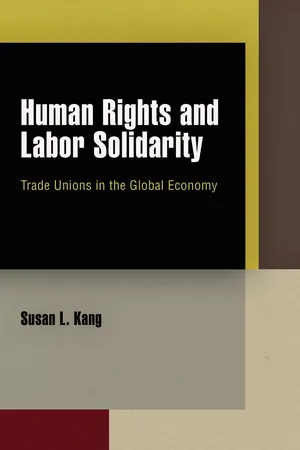
- 336 pages
- English
- ePUB (mobile friendly)
- Available on iOS & Android
About This Book
Faced with the economic pressures of globalization, many countries have sought to curb the fundamental right of workers to join trade unions and engage in collective action. In response, trade unions in developed countries have strategically used their own governments' commitments to human rights as a basis for resistance. Since the protection of human rights remains an important normative principle in global affairs, democratic countries cannot merely ignore their human rights obligations and must balance their international commitments with their desire to remain economically competitive and attractive to investors. Human Rights and Labor Solidarity analyzes trade unions' campaigns to link local labor rights disputes to international human rights frameworks, thereby creating external scrutiny of governments. As a result of these campaigns, states engage in what political scientist Susan L. Kang terms a normative negotiation process, in which governments, trade unions, and international organizations construct and challenge a broader understanding of international labor rights norms to determine whether the conditions underlying these disputes constitute human rights violations. In three empirically rich case studies covering South Korea, the United Kingdom, and Canada, Kang demonstrates that this normative negotiation process was more successful in creating stronger protections for trade unions' rights when such changes complemented a government's other political interests. She finds that states tend not to respect stronger economically oriented human rights obligations due to the normative power of such rights alone. Instead, trade union transnational activism, coupled with sufficient political motivations, such as direct economic costs or strong rule of law obligations, contributed to changes in favor of workers' rights.
Frequently asked questions
Information
Table of contents
- Cover Page
- Title Page
- Copyright Page
- Dedication Page
- Contents
- Preface
- List of Abbreviations
- Chapter 1. The Precarious Position of Trade Union Rights in the Global Political Economy
- Chapter 2. Negotiations and Norms: The Development of Trade Union Rights in International Law and Institutions
- Chapter 3. International Institutions and their Protections of Trade Union Rights
- Chapter 4. South Korea: International Ambitions and the Postdevelopmental State
- Chapter 5. United Kingdom: New Labour and New Labor Rights?
- Chapter 6. Canada: Federalism and Stalled Compliance
- Conclusion. International Norms, Trade Union Rights, and Countering Neoliberalism
- Appendix I. Kucera's Measure of Freedom of Association and Collective Bargaining
- Appendix II. Number of Unions/Unionization Rate in Korea: 1987-2003
- Appendix III. Case Disputes and U.S. Law
- Notes
- Bibliography
- Index
- Acknowledgments